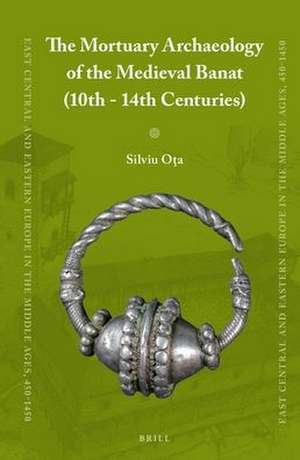The Mortuary Archaeology of the Medieval Banat (10th-14th Centuries): East Central and Eastern Europe in the Middle Ages, 450-1450, cartea 26
Autor Silviu Otaen Limba Engleză Hardback – 27 oct 2014
Din seria East Central and Eastern Europe in the Middle Ages, 450-1450
- 18%
 Preț: 800.46 lei
Preț: 800.46 lei - 18%
 Preț: 743.33 lei
Preț: 743.33 lei - 18%
 Preț: 1022.29 lei
Preț: 1022.29 lei - 18%
 Preț: 1176.15 lei
Preț: 1176.15 lei - 18%
 Preț: 731.25 lei
Preț: 731.25 lei - 18%
 Preț: 730.01 lei
Preț: 730.01 lei - 18%
 Preț: 893.05 lei
Preț: 893.05 lei - 18%
 Preț: 1010.45 lei
Preț: 1010.45 lei - 18%
 Preț: 1223.50 lei
Preț: 1223.50 lei - 18%
 Preț: 1048.15 lei
Preț: 1048.15 lei - 18%
 Preț: 940.83 lei
Preț: 940.83 lei - 18%
 Preț: 976.42 lei
Preț: 976.42 lei - 18%
 Preț: 940.07 lei
Preț: 940.07 lei - 18%
 Preț: 776.92 lei
Preț: 776.92 lei - 18%
 Preț: 648.08 lei
Preț: 648.08 lei - 18%
 Preț: 631.60 lei
Preț: 631.60 lei - 18%
 Preț: 709.54 lei
Preț: 709.54 lei - 18%
 Preț: 1320.28 lei
Preț: 1320.28 lei - 18%
 Preț: 545.07 lei
Preț: 545.07 lei - 18%
 Preț: 814.51 lei
Preț: 814.51 lei - 18%
 Preț: 793.91 lei
Preț: 793.91 lei - 18%
 Preț: 695.49 lei
Preț: 695.49 lei - 18%
 Preț: 525.08 lei
Preț: 525.08 lei - 18%
 Preț: 707.77 lei
Preț: 707.77 lei - 18%
 Preț: 706.81 lei
Preț: 706.81 lei - 70%
 Preț: 625.11 lei
Preț: 625.11 lei - 18%
 Preț: 1540.16 lei
Preț: 1540.16 lei - 18%
 Preț: 851.46 lei
Preț: 851.46 lei - 18%
 Preț: 826.36 lei
Preț: 826.36 lei - 18%
 Preț: 670.69 lei
Preț: 670.69 lei - 18%
 Preț: 817.49 lei
Preț: 817.49 lei - 18%
 Preț: 871.88 lei
Preț: 871.88 lei - 64%
 Preț: 715.27 lei
Preț: 715.27 lei - 18%
 Preț: 819.97 lei
Preț: 819.97 lei - 18%
 Preț: 849.51 lei
Preț: 849.51 lei - 18%
 Preț: 954.10 lei
Preț: 954.10 lei - 18%
 Preț: 1089.95 lei
Preț: 1089.95 lei - 15%
 Preț: 428.32 lei
Preț: 428.32 lei - 18%
 Preț: 730.47 lei
Preț: 730.47 lei - 18%
 Preț: 878.41 lei
Preț: 878.41 lei - 18%
 Preț: 730.01 lei
Preț: 730.01 lei - 18%
 Preț: 760.53 lei
Preț: 760.53 lei - 18%
 Preț: 636.93 lei
Preț: 636.93 lei - 18%
 Preț: 908.17 lei
Preț: 908.17 lei - 18%
 Preț: 882.32 lei
Preț: 882.32 lei - 18%
 Preț: 920.99 lei
Preț: 920.99 lei - 18%
 Preț: 577.99 lei
Preț: 577.99 lei - 18%
 Preț: 1323.50 lei
Preț: 1323.50 lei - 18%
 Preț: 1130.38 lei
Preț: 1130.38 lei
Preț: 1055.16 lei
Preț vechi: 1286.78 lei
-18% Nou
Puncte Express: 1583
Preț estimativ în valută:
201.91€ • 211.34$ • 168.05£
201.91€ • 211.34$ • 168.05£
Carte indisponibilă temporar
Doresc să fiu notificat când acest titlu va fi disponibil:
Se trimite...
Preluare comenzi: 021 569.72.76
Specificații
ISBN-13: 9789004214385
ISBN-10: 9004214380
Pagini: 386
Dimensiuni: 155 x 235 x 25 mm
Greutate: 0.74 kg
Editura: Brill
Colecția Brill
Seria East Central and Eastern Europe in the Middle Ages, 450-1450
ISBN-10: 9004214380
Pagini: 386
Dimensiuni: 155 x 235 x 25 mm
Greutate: 0.74 kg
Editura: Brill
Colecția Brill
Seria East Central and Eastern Europe in the Middle Ages, 450-1450
Cuprins
Acknowledgements…vii
List of Illustrations…viii
List of Map Sites…xvi
Abbreviations…xx
1 Introduction: The State of Current Research on the Banat between the 10th and the 14th Century…1
2 The History of the Banat between the 10th and the 14th Century According to the Written Sources…18
3 Burial Customs in the Banat (10th–14th Centuries) …46
4 Grave Good Typology…111
5 Burial Horizons in the Medieval Banat…171
6 Conclusions…198
Select Bibliography…207
Illustrations…227
Index…366
i-
List of Illustrations…viii
List of Map Sites…xvi
Abbreviations…xx
1 Introduction: The State of Current Research on the Banat between the 10th and the 14th Century…1
2 The History of the Banat between the 10th and the 14th Century According to the Written Sources…18
3 Burial Customs in the Banat (10th–14th Centuries) …46
4 Grave Good Typology…111
5 Burial Horizons in the Medieval Banat…171
6 Conclusions…198
Select Bibliography…207
Illustrations…227
Index…366
i-
Notă biografică
Silviu Oţa, Ph.D. (2004), National Museum of History, Romania, is archaeologist at that museum. He has published many studies on medieval cemeteries, Byzantine jewelry, Turkic communities in the Banat.
Descriere
In 'The Mortuary Archaeology of the Medieval Banat (10th 14th centuries)', Silviu Ota highlights the interactions between different ethnic groups as reflected in burial customs. The book will deal with the Banat as a whole since the modern political borders are not identical with the cultural boundaries in the Middle Ages.
